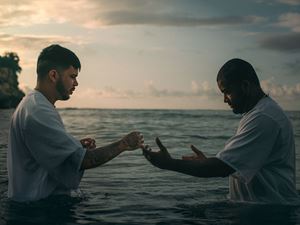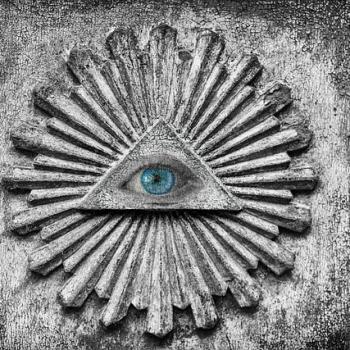
October 2023 saw Belfast host an annual conference called One Young World. I didn’t attend it myself, but I happened to catch a speech that a local charity director called Matthew Taylor, also from Northern Ireland, gave to the delegates. I have a lot of time for Matthew and his mental health advocacy. Matthew – who, for context, is open about his own experiences of mental ill-health – puts the question, ‘I know I could survive anything, but do I want to?’ He continues, ‘This is the question our generation has the unfortunate destiny of trying to answer.’
Matthew’s right. In fact, all prior generations have confronted this question too. (We might even say ‘the Question’ with a capital ‘Q’). Ever since mankind evolved to the point of self-awareness, the Question has never ceased to haunt us. It always will. This is a religious blog; and so, from a Christian perspective, I believe that baptism has to be part of a response — a significant part of a response — to the Question. Baptism articulates much of our faith’s greatest wisdom on the subject.
I was baptized in a Presbyterian Church, but I became an Anglican as an adult; and if I were a parent, I would seek Anglican baptism for my kids. Therefore, this article reflects on the Book of Common Prayer’s Order for Holy Baptism. Essentially, baptism is the primary means by which faith passes from one generation to the next, but how do we live in the light of our baptism?
We may not choose the duties we bear, but we may choose how to fulfil them. This is a key lesson to glean from Anglican baptism. The duties in question are laid out. On behalf of the child, baptismal sponsors: (1) ‘reject the devil and all proud rebellion against God’; (2) ‘renounce the deceit and corruption of evil’; (3) ‘repent of the sins that separate us from God and neighbor’; (4) ‘turn to Christ as Saviour’; (5) ‘submit to Christ as Lord’; and (6) ‘come to Christ, the Way, the Truth and the Life.’
In addition to the promises above, made by the sponsors, the priest makes the sign of the cross on the child’s forehead and announces what will become the child’s duties in life: ‘Live as a disciple of Christ, fight the good fight, finish the race, keep the faith.’ Every Christian, then, shares the same destiny. Within this common destiny, though, there is ample space, ‘plenty good room,’ to make something unique of our lives. Baptism is a blessing; it isn’t a straitjacket!
I would rather have a framework like the Christian faith, which reveals possibilities through the limited number of restrictions it imposes, than stumble through life directionless. ‘There are many ways to live a good life,’ as Reverend Ames from Gilead, a 2004 novel by Marilynne Robinson, puts it: many ways to live as a disciple of Christ; many ways to fight the good fight; many ways to finish the race; many ways to keep the faith.
A. C. Grayling is a British academic. As I write, I have his new book, Philosophy and Life, beside me. ‘The premise of the discussion in this book,’ Grayling writes, ‘is that individuals have to choose their values and goals for themselves and take responsibility for living accordingly.’ The reader might ask, why so? ‘Among the big advantages,’ continues Grayling, ‘is that one can truly ‘live with oneself’ – have self-respect – because the endeavor to live a chosen and self-directed life is a noble thing’ (p. 82).
There is a level of truth in this. As I noted above, baptism does not abolish individual initiative. And so, the Christian, too, can enjoy the freedom of ‘a chosen and self-directed life.’ I would argue differently from Grayling, however, in respect of two things: (1) that individuals do not make all their own choices; and (2) that sometimes the noble option is to fulfil choices made on one’s behalf.
Consider an illustration from popular culture: the Sam Raimi "Spider-Man" film trilogy, which was a big part of my childhood. In the first movie, Spider-Man (2002), Tobey Maguire’s Peter Parker sustains a spider bite, which transforms him into the titular superhero. ‘With great power comes great responsibility,’ Peter’s Uncle Ben cautions him. Uncle Ben sees that Peter has had a new destiny thrust upon him, one that offers him a chance to make a difference in the world.
Hopefully the parallel with baptism is clear. Just as Peter didn’t seek to become Spider-Man – he doesn’t pick the spider up and stab himself with its teeth! – infants who receive baptism do not rationalise their way to faith. It’s a gift; and every gift, in those words of Uncle Ben, brings with it responsibility.
To be baptized is to become part of a family: the parish family, but also the worldwide Christian family. Communities of believers, united in ‘one Lord, one faith, one baptism’ (Ephesians 4.5), come together to bear one another’s burdens, as Christ has done for us, and to dream of a better world.
So many people struggle to find a meaning in life because they feel the traditional sources of meaning, like religion, to be cop-outs. As modern, rational individuals with progressive and idealistic values, we cannot be beholden to superstitious nonsense like religion for our sense of identity! Look around at our mental health crisis and ask yourself, ‘Has this philosophy worked?’
For my part, I’m eternally grateful to have been grafted into Christ, and without my consent – imagine! When I walked up to the baptismal font with my parents, I was four. My mind was probably wrapped up in far weightier matters than eternal salvation: Xbox games like The Simpsons: Hit & Run, for example. Still, my parents decided my soul would belong to God; it’s astonishing to think anyone has that power. And so, the baptism I received as a child enabled the faith I have now to take root.
Matthew Taylor, in his powerful speech, talked about a question, the Question, ‘that our generation has the unfortunate destiny of trying to answer.’ Marylinne Robinson framed the Question like this, in the title of her most recent essay collection: What Are We Doing Here? Baptism dares to publish a response to the Question: ‘Live as a disciple of Christ, fight the good fight, finish the race, keep the faith.’ Do so, and you will discover, as the years unfold, the person whom God has made you to be.
11/9/2023 3:10:34 AM





